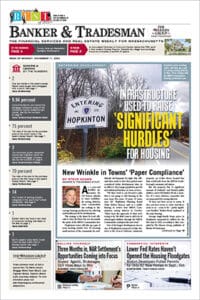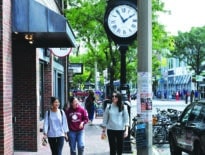When a developer feels a $50,000 bribe is a good investment to secure a permit extension that is generally regarded as a formality, it’s clear there is larger rot in Boston’s land use decision-making apparatus.
Leaving aside the possibility that John M. Lynch, the former assistant director of real estate at the Economic Development Industrial Corp., hoodwinked the developer in question – who, curiously, U.S. Attorney for Boston Andrew Lelling has yet to name publicly or charge – it appears this bribe may have been intended to neutralize opposition from some local vested interest or another. The nature of that opposition is currently unclear; perhaps the wrong contractor was being employed to do the wiring, or maybe it was kitty-corner to someone’s friend’s cousin’s barber.
Boston has historically been a city of tribes. Brahmins, South End Puerto Ricans, South Boston Irish, Jamaica Plain Yuppies, and dozens more communities with overlapping membership have all duked it as blocs out over the centuries for prizes ranging from seats on the city council to the quality of trash pickup.
It’s the same mindset that leads some power brokers to put their thumb on the scale in wholly improper ways. Witness U.S. Rep. Stephen Lynch’s ransom note to Hilco Residential and Redgate Capital Partners in November of last year. In a comment letter submitted to the Boston Planning & Development agency, he demanded a 120-space parking garage for Southie residents in the two firms’ proposed redevelopment of the South Boston Edison Plant, plus other changes, as the price for his non-opposition. This, even though South Boston is already choking on traffic and volumes of research showing new parking capacity in a development or area only encourages more car ownership and use.
The Boston ZBA’s peculiar structure, with the enabling legislation setting aside seats for nominees from groups dedicated to “the preservation of the quality of residential life” in a specific neighborhood, the Boston Society of Architects and more, only encourages this way of thinking, and allows vested interests with little interest in transparent, fair and equally applied land use rules to bend the system to its will.
It’s true the city has made significant strides in cleaning out the Augean stable that was the Boston Redevelopment Authority, predecessor agency to the BPDA. However, as the city struggles with how to respond to John Lynch’s guilty plea, its leaders and voters should remember the rot extends to other parts of Boston City Hall’s ninth floor.
The politicization of land use votes is enabled by a city planning staff that routinely fails to deliver realistic development visions in a timely fashion. Whether due to political pressure from above or an unwillingness to face difficult facts, neighborhood plans are sometimes dialed back to a point where as-of-right projects are not economically viable, forcing any development through a sometimes-fraught zoning relief process. Other times, understandably lengthy public processes are started far too late to be helpful in shaping development.
Fixing Boston’s broken land use system is a tall order, and will require Boston’s leaders – both those in power and waiting in the wings – to craft a compromise grounded in the economic realities of development.





